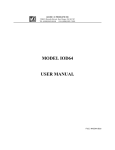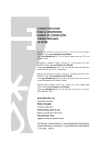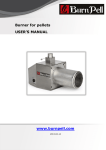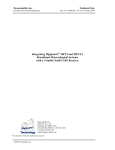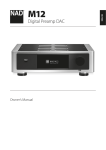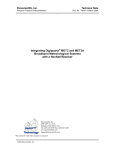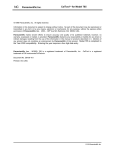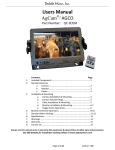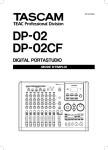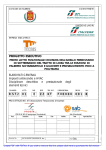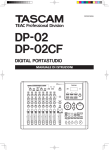Download User Manual
Transcript
Paroscientific, Inc. Digiquartz® Pressure Instrumentation Digiquartz Broadband Pressure Transducers And Depth Sensors With Frequency Outputs User Manual “The standard by which other standards are measured” Digiquartz® Broadband Pressure Transducers And Depth Sensors With Frequency Outputs User Manual DOCUMENT NO. G8203 REVISION N JULY 2011 WWW.PAROSCIENTIFIC.COM COPYRIGHT 2011 PAROSCIENTIFIC, INC. Contents 1. Introduction 1.1 7 Conventions . . . . . . . . . . . . . . . . . . . . . . . . . . . . . . . . . . . . . 7 2. Getting Familiar 2.1 2.2 2.3 2.4 9 Features . . . . . . . . . . . . . . . . . . . . . . . . . . . . . . . . . . . . . . . . 9 Physical Inspection . . . . . . . . . . . . . . . . . . . . . . . . . . . . . . . 9 Handling Precautions . . . . . . . . . . . . . . . . . . . . . . . . . . . . . . 9 Documents . . . . . . . . . . . . . . . . . . . . . . . . . . . . . . . . . . . . . 10 3. Installation 3.1 3.2 11 Pressure Ports and Buffer Tubes . . . . . . . . . . . . . . . . . . . . 11 Oil Filled vs. Non-Oil Filled Units . . . . . . . . . . . . . . . . . . 12 4. Electrical 4.1 13 Characteristics . . . . . . . . . . . . . . . . . . . . . . . . . . . . . . . . . . 13 5. Calculating Pressure and Temperature 5.1 5.2 15 Temperature Calculation . . . . . . . . . . . . . . . . . . . . . . . . . . 15 Pressure Calculation. . . . . . . . . . . . . . . . . . . . . . . . . . . . . . 15 6. Digiquartz Data Storage (DDS) 6.1 6.2 6.3 6.4 17 DDS Wires . . . . . . . . . . . . . . . . . . . . . . . . . . . . . . . . . . . . 17 EEPROM Type . . . . . . . . . . . . . . . . . . . . . . . . . . . . . . . . . 17 Chip Address . . . . . . . . . . . . . . . . . . . . . . . . . . . . . . . . . . . 17 Memory Map . . . . . . . . . . . . . . . . . . . . . . . . . . . . . . . . . . . 18 7. Accessories and Software 7.1 7.2 7.3 7.4 21 Model 735 Intelligent Display . . . . . . . . . . . . . . . . . . . . . . 21 Digiquartz Intelligent Interface Board . . . . . . . . . . . . . . . . 21 Model 715 Display. . . . . . . . . . . . . . . . . . . . . . . . . . . . . . . 21 Digiquartz Software Programs. . . . . . . . . . . . . . . . . . . . . . 22 • • v • • 8. Calibration 23 9. Warranty and Technical Support 25 9.1 9.2 Warranty Information . . . . . . . . . . . . . . . . . . . . . . . . . . . . 25 Technical Support and Service . . . . . . . . . . . . . . . . . . . . . 26 10. Pressure Unit Conversion Table vi • • • • 27 • • • • • • • • • • 1 Introduction • • • • • • • • • • • • • • • • • • • • • • • • • • • • • This manual is intended to offer installation and start up information for Paroscientific Digiquartz® Broadband Pressure Transducers and Depth Sensors with frequency outputs. Digiquartz Broadband Pressure Transducers are precision instruments and, as such, must be used with a certain degree of care. To ensure optimum performance, please follow the installation and handling recommendations presented in this manual. Additional product, installation, and operating information is available on the Paroscientific website at www.paroscientific.com. 1.1 Conventions The following conventions are used throughout this manual: Digiquartz Broadband Pressure Transducer – Any Digiquartz Broadband Pressure Transducer with frequency outputs. Digiquartz Broadband Depth Sensor – Any Digiquartz Broadband Pressure Transducer with frequency outputs that is specially packaged for depth sensing applications. CAUTION is used to draw your attention to a situation that may result in an undesirable outcome, but will not damage the unit. WARNING is used to draw your attention to a situation that may result in permanent damage to the unit or will void the warranty. DANGER is used to draw your attention to a situation that may result in injury. • INTRODUCTION •• 7 • - This page intentionally left blank - 8 • • INTRODUCTION • • • • • • • • • • • • 2 Getting Familiar • • • • • • • • • • • • • • • • • • • • • • • • • • • • • 2.1 Features General descriptions and feature summaries for Digiquartz Broadband Pressure Transducers can be found on the Paroscientific website at www.paroscientific.com. Additional details are shown on the Specification Control Drawing that is shipped with the transducer. 2.2 Physical Inspection You should have received the following items with your Digiquartz Broadband Pressure Transducer purchase: • Digiquartz Broadband Pressure Transducer or Depth Sensor • User’s manual • Specification Control Drawing (SCD) for the Digiquartz Broadband Pressure Transducer or Depth Sensor • Calibration Coefficient Sheet • Certificate of Calibration • Certificate of Conformance 2.3 Handling Precautions Digiquartz Broadband Pressure Transducers are precision devices and, as such, they should be operated with a certain degree of care to ensure optimum performance. WARNING It is recommended that the input pressure not exceed the specified limit. Calibration can be affected if this limit is exceeded, and permanent damage can result if the unit is sufficiently overpressured. WARNING Excessive mechanical shock may cause irreparable damage. Do not drop a Digiquartz Broadband Pressure Transducer, or allow tools or other hard objects to fall on the unit or its pressure port. If so equipped, the nylon or stainless steel buffer tube is an integral part of the transducer’s shock isolation system, and should not be removed. • GETTING FAMILIAR •• 9 • 2.4 Documents The following documents are supplied with each Digiquartz Broadband Pressure Transducer. SPECIFICATION CONTROL DRAWING (SCD) The SCD is a drawing that contains information about the performance, characteristics, environmental specifications, and physical dimensions of the unit. CALIBRATION COEFFICIENT SHEET The Calibration Coefficient Sheet contains the calibration coefficient values and the associated modeling equations (see Section 5). The calibration coefficients are derived from a calibration test run, and are unique to each Digiquartz Broadband Pressure Transducer. CERTIFICATE OF CALIBRATION The Certificate of Calibration identifies the primary pressure standard(s) used to calibrate the Digiquartz Broadband Pressure Transducer. CERTIFICATE OF CONFORMANCE The Certificate of Conformance certifies that the Digiquartz Broadband Pressure Transducer was manufactured in accordance with the applicable engineering drawings, process specifications, procedures, and specification control drawing. It also certifies that the Digiquartz Broadband Pressure Transducer was tested against NIST-traceable primary pressure standards, temperature standards, and pressure transfer standards that are regularly checked and calibrated per documented Paroscientific procedures in accordance with ISO 9001 requirements. 10 • • GETTING FAMILIAR • • • • • • • • • • • • 3 Installation • • • • • • • • • • • • • • • • • • • • • • • • • • • • • Digiquartz Broadband Pressure Transducers can generally be mounted in any orientation. Mounting hole patterns for units so equipped can be found on the Specification Control Drawing (SCD) supplied with the unit. CAUTION Pressure head effects vary with transducer orientation, and result in zero offsets. These effects are more pronounced when liquid-filled pressure lines are being used. These effects can be minimized by keeping the transducer pressure port and the pressure source at the same elevation, or by making an offset correction to compensate for the pressure head. 3.1 Pressure Ports and Buffer Tubes Digiquartz Broadband Pressure Transducers typically include a nylon or stainless steel buffer tube. The buffer tube is an integral part of the mechanical shock protection system of the transducer. Parker A-Lok or equivalent nut and ferrule compression tube fittings are used on most Digiquartz Broadband Pressure Transducers. Series 2000 devices require 1/8” diameter tubing fittings for installation, while series 3000 and 4000 use 1/16” diameter tube fittings. Two 7/16" wrenches are required when making or breaking any 1/8-inch pressure fitting. The first wrench is used to stabilize the stationary fitting, and the second wrench is used to turn the other fitting. High-pressure transducers (Series 3000 and Series 4000) use the 1/16" Parker A-Lok or equivalent fittings. Two 5/16" wrenches are required to make and break these connections. CAUTION It is recommended that pressure fittings be installed finger tight, then tightened an additional ¾ turn to complete the pressure seal. WARNING Avoid making connections directly to the transducer pressure fitting. Make connections to the buffer tube fitting wherever possible. If the transducer pressure fitting becomes flared, stripped or damaged, it will be necessary to return the unit to Paroscientific for repairs. WARNING Do not remove the buffer tube. It is an integral part of the mechanical shock protection system of the transducer. • INSTALLATION •• 11 • 3.2 Oil Filled vs. Non-Oil Filled Units OIL FILLED TRANSDUCERS Transducers that are to be used to measure liquid media pressures are oil filled at Paroscientific. Transducers that are oil filled should never be used in gas media applications. Oil fill and bleed all pressure lines that are to be connected to an oil filled transducer. The same oil used to fill the transducer should be used to fill the pressure lines; consult the transducer Specification Control Drawing for details. CAUTION If your transducer and buffer tube are oil filled, do not pull a vacuum or apply pressurized gas to the unit. Doing so could allow bubbles to form in the pressure lines and transducer, which will adversely affect the accuracy of the unit. CAUTION Pressure head effects result in zero offsets. These effects are more pronounced when liquid filled pressure lines are being used. These effects can be minimized by keeping the transducer pressure port and the pressure source at the same elevation, or by making an offset correction to compensate for the pressure head. NON-OIL FILLED TRANSDUCERS Non-oil filled transducers are intended for use in gas media applications, and should never be used in liquid media applications. WARNING If your transducer and buffer tube are not oil-filled, do not apply pressurized liquid media to the unit. Liquid may contaminate the unit, and may adversely affect the accuracy of the unit. It is not possible to completely remove most liquids from the transducer once they have been introduced. 12 • • INSTALLATION • • • • • • • • • • • • 4 Electrical • • • • • • • • • • • • • • • • • • • • • • • • • • • • • 4.1 Characteristics PRESSURE SIGNAL Signal Type: Amplitude: Source Impedance: Range: AC coupled nominal square wave Nominal 4V peak to peak Less than 750 Ohms Nominal 10% frequency change within the band of 30 kHz to 42 kHz. TEMPERATURE SIGNAL Signal Type: Amplitude: Source Impedance: Range: AC coupled nominal square wave Nominal 4V peak to peak Less than 750 Ohms Nominal 45 ppm/C sensitivity within the band of 168 kHz to 174 kHz. SUPPLY VOLTAGE Refer to Specification Control Drawing supplied with transducer. CURRENT CONSUMPTION Refer to Specification Control Drawing supplied with transducer. WARNING Power/signal ground are connected to the transducer pressure fitting (and in some cases, the transducer housing) through a 0.1µF 50V capacitor. To prevent damage to the transducer electronics, ensure that the potential between power/signal ground and the pressure fitting does not exceed 50V. CAUTION Current consumption increases when driving long lines or low impedances. Refer to the Specification Control Drawing supplied with the transducer for output loading recommendations. • ELECTRICAL •• 13 • TRANSDUCER WIRES Most Digiquartz Broadband Pressure Transducers bring out their output and power connections on flying wire leads. The pressure and temperature signals are typically brought out separately as twisted pairs with power/signal ground. The wires are colorcoded per following table: TABLE 4-1: Transducer Wire Color-Coding Wire Color Signal Red Power Blue / Black twisted Pressure Signal / Ground White / Black twisted Temperature Signal / Ground CAUTION Do not bundle pressure and temperature wires together. Doing so can cause the temperature signal to couple into the pressure signal, which may result in an unnecessarily noisy pressure signal. CAUTION If pressure and temperature wires are to be extended, also extend the associated black ground wires, and ensure that the extension wires are also twisted at a rate of at least 4 to 5 twists per inch. Failure to do so can cause the temperature signal to couple into the pressure signal, which may degrade sensor performance. 14 • • ELECTRICAL • • • • • • • • • • • • 5 Calculating Pressure and Temperature • • • • • • • • • • • • • • • • • • • • • • • • • • • • • Internal sensor temperature and applied pressure are calculated from period measurements of the two transducer output signals. The equations and coefficients used to perform these calculations are described below. Refer to the Calibration Coefficient Sheet for the actual coefficient values for your transducer. 5.1 Temperature Calculation The following equation is used to calculate internal sensor temperature: T = Y1U + Y2U2 + Y3U3 Where: T = Temperature (°C) U0 = temperature signal period (microseconds) at 25° C U = temperature signal period (microseconds) – U0 (microseconds) Temperature coefficients: U0 Y1 Y2 Y3 5.2 Pressure Calculation The following equation is used to calculate pressure: P = C(1 – T02/Tau2)[1 – D(1– T02/Tau2)] Where: P = pressure Tau = pressure signal period (microseconds) U = temperature signal period (microseconds) – U0 (microseconds) C = C1 + C2U + C3U2 D = D1 + D2U T0 = T1 + T2U + T3U2 + T4U3 + T5U4 Pressure coefficients: C1 C2 C3 D1 D2 T1 T2 T3 T4 T5 • CALCULATING PRESSURE AND TEMPERATURE •• 15 • - This page intentionally left blank - 16 • • CALCULATING PRESSURE AND TEMPERATURE • • • • • • • • • • • • 6 Digiquartz Data Storage (DDS) • • • • • • • • • • • • • • • • • • • • • • • • • • • • • Most Digiquartz Broadband Pressure Transducers include the Digiquartz Data Storage (DDS) feature. Transducers with DDS can be identified by the presence of the wires described in Section 6.1. Digiquartz Data Storage (DDS) is an onboard serial EEPROM that contains calibration and transducer information. This information can be accessed electronically to provide plug and play pressure transducer interchangeability. An additional 4k bytes of DDS EEPROM memory has been allocated for customer use. NOTE: The sole purpose of DDS is to store transducer configuration information. Use of DDS is optional, and does not affect pressure measurement. A minimum wire length of 6 inches is required to program DDS. If one chooses to remove the DDS wires, the recommended method is to cut the DDS wires to the desired length and protect the exposed leads with heat shrink. WARNING Voltages outside the range of -0.3 to 4.3 volts must not be applied to the SDA (Serial Data) and SCL (Serial Clock) signal lines. Doing so will damage the DDS serial EEPROM. CAUTION The maximum recommended length of the SDA and SCL wires is 18 inches. Serial communication with the serial EEPROM may become unreliable at longer wire lengths. 6.1 DDS Wires TABLE 6-1: DDS Wire Color-Coding Wire Color Signal White / Brown SCL White / Violet SDA Black Ground 6.2 EEPROM Type The DDS serial EEPROM is a Microchip Technology 24LC64 or equivalent. For interface information, please consult the manufacturer’s data sheet for this device, which can be obtained at the Microchip Technology website at www.microchip.com. 6.3 Chip Address The chip address of the DDS serial EEPROM is fixed at binary 101. Any device used to communicate with DDS must be able to select the proper chip address. • DIGIQUARTZ DATA STORAGE (DDS) •• 17 • 6.4 Memory Map The information stored in DDS memory is organized as shown in the table below. All data are stored in fixed length fields in ASCII format. All used fields are padded from the end of the data to the end of the field with space characters (ASCII 32 decimal). 256 bytes of data storage starting at address 1000 hex has been reserved for your use. CAUTION Do not store data at addresses below 1000 hex. This memory space is reserved for Paroscientific use. Table 6-2: DDS Memory Map Field No Address Description (Hex) Field Length (Bytes) General Information 1 0000-000F EEPROM Revision 16 2-6 0010-005F Customer Information 80 7 - 11 0060-00AF Reserved 80 Sensor Information 12 00B0-00BF Serial Number 16 13 00C0-00CF Part Number 16 14-15 00D0-00EF Model Description 32 16-17 00F0-010F Pressure Range 32 18-19 0110-012F Temperature Range 32 20 0130-013F Report Date 16 21 0140-014F Pressure Medium 16 22 0150-015F Sensor Type 16 23 - 27 0160-01AF Reserved 80 Calibration Data 18 28 01B0-01BF Calibration Date 29 01C0-01CF Pressure Units 16 30 01D0-01DF Temperature Units 16 31 01E0-01EF U0 Coefficient 16 32 01F0-01FF Y1 Coefficient 16 33 0200-020F Y2 Coefficient 16 34 0210-021F Y3 Coefficient 16 35 0220-022F C1 Coefficient 16 36 0230-023F C2 Coefficient 16 37 0240-024F C3 Coefficient 16 38 0250-025F D1 Coefficient 16 39 0260-026F D2 Coefficient 16 40 0270-027F T1 Coefficient 16 41 0280-028F T2 Coefficient 16 • • DIGIQUARTZ DATA STORAGE (DDS) • • 16 Table 6-2: DDS Memory Map Field No Address Description (Hex) Field Length (Bytes) Calibration Data 42 0290-029F T3 Coefficient 16 43 02A0-02AF T4 Coefficient 16 44 02B0-02BF T5 Coefficient 16 45 02C0-02CF Pressure Adder 16 46 02D0-02DF Pressure Multiplier 16 47 - 51 02E0-032F Reserved 80 Common-Mode Calibration 52 0330-033F Common-Mode Coefficient Units 10 53 0340-034F A1 Coefficient 16 54 0350-035F A2 Coefficient 16 55 0360-036F B1 Coefficient 16 56 0370-037F P0 Coefficient 16 Reserved 57 - 256 0380-05CF Paroscientific Reserved 592 257 - 512 1000-1FFF User Reserved 4096 • DIGIQUARTZ DATA STORAGE (DDS) •• 19 • - This page intentionally left blank - 20 • • DIGIQUARTZ DATA STORAGE (DDS) • • • • • • • • • • • • 7 Accessories and Software • • • • • • • • • • • • • • • • • • • • • • • • • • • • • 7.1 Model 735 Intelligent Display If your application requires RS-232 interface, a display, or transducer control and monitoring without a computer, the Model 735 can be the best choice for you. The Model 735 Intelligent Display performs all of the functions of the Model 745 High Accuracy Portable Standard when connected to a single external Digiquartz Transducer. It features an intuitive front panel menu system, two-line display, RS-232 communication port, tare capability, and transducer connection terminals. The Model 735 can be powered from its AC adapter, or for up to 20 hours from AA alkaline batteries. Configuration and data logging software provided with the unit allows the user to configure and log data from Model 735 via RS-232. 7.2 Digiquartz Intelligent Interface Board The Digiquartz Intelligent Interface Board is a microprocessor-based interface that processes the frequency outputs from a single Digiquartz transducer. It provides fully temperature-compensated pressure measurement values in the user’s choice of engineering units. Dual RS-232 and RS-485 serial interfaces are provided. The user may program the sample rate, integration time, engineering units, and communication parameters via the serial interfaces. Multiple transducer/board combinations can be connected together to form an RS-232 serial loop or RS-485 multi-drop network. Set-up and data acquisition software are included with the Digiquartz Intelligent Interface Board. The Digiquartz Intelligent Interface Board is compatible with the Model 715 display. 7.3 Model 715 Display The Model 715 displays pressure and temperature data from all Paroscientific Intelligent Transmitters that have dual RS-232 and RS-485 interfaces. The two-line, 16-character backlit alphanumeric liquid crystal display is set up with transmitter commands and included software. Display functions include pressure and temperature values with engineering units, overpressure warning, tare indicator, user defined text messages, and a horizontal analog bar graph showing pressure as a percentage of full-scale pressure. The Model 715 will respond to display commands from a Digiquartz transmitter, a computer, or other serial host on either the RS-232 or RS-485 port. For stand-alone operation, it can display data whenever power is applied to the transmitter. • ACCESSORIES AND SOFTWARE •• 21 • 7.4 Digiquartz Software Programs Paroscientific provides software programs that simplify common measurement and configuration tasks. The latest versions of these and other software programs are available at the Paroscientific web site www.paroscientific.com. Digiquartz Broadband Pressure Transducers require an intelligent board or Model 735 Intelligent Display to interface with PC-based Digiquartz Software. A transducer can also interface directly with third-party data acquisition systems that measure frequency signals. In this case, the user would need to develop their own software to acquire and process the signal output from the transducer. 7.4.1 Digiquartz Interactive 2.0 (DQI 2.0) Digiquartz Interactive 2.0 is a Windows program that makes it easy to communicate with and configure DIGIQUARTZ Intelligent devices. We encourage you to install DQI 2.0 and use it to verify proper device operation, configure your device, take measurements, and experiment with its functions. DQI 2.0 is separated into two main sections: Configuration and Monitoring, and Digiquartz Terminal. The Configuration and Monitoring section provides a means of viewing, changing, storing, and retrieving the configuration parameters of your instrument. It also allows you to take measurements and display them numerically and in a real-time graph. Measurement data may also be logged to a text file in a format that can be easily imported into popular PC programs such as Microsoft Excel® or Word®. The Digiquartz Terminal section allows you to interactively communicate with your instrument using text-based commands. Measurement data may be logged to a text file in a format that can be easily imported into popular PC programs such as Microsoft Excel or Word. 7.4.2 Digiquartz Assistant (DQA) DIGIQUARTZ Assistant is a Windows data logging program. With DQA, you can log time-stamped measurement data from up to 8 DIGIQUARTZ Intelligent devices. Measurement data can also be displayed in real time in an automatically scaled graph. Data is stored to a text file in a format that can easily be imported into popular PC programs such as Microsoft Word or Excel. Refer to the help function in DQA for more information. 22 • • ACCESSORIES AND SOFTWARE • • • • • • • • • • • • 8 Calibration • • • • • • • • • • • • • • • • • • • • • • • • • • • • • Paroscientific is the leader in the high precision pressure measurement field where high resolution, accuracy, reliability, ruggedness, long-term stability, and low cost of ownership are important requirements. The high performance of Digiquartz Instruments is a result of careful design, meticulous manufacturing, and extensive calibration and testing. The construction, operation, and performance of Paroscientific transducers are described on our web site. Calibration is performed by applying known pressures from primary standards to manifolds of transducers mounted in temperature chambers. Two frequency (or period) output signals are sent from each transducer. Pressure is measured with a force-sensitive quartz crystal whose output period changes with applied load. A second period output comes from a quartz crystal temperature sensor used for thermal compensation. The manifold of transducer signals are multiplexed, measured, and the data fit to derive coefficients for the standard equation that characterizes the transducers. The calibration coefficients provided with each transducer and the indicated pressure (calculated) will agree with the "true" applied pressure with a typical accuracy of 0.01 percent or better of transducer full scale over the full operational range of pressures and temperatures. Digiquartz Intelligent Transmitters store the calibration coefficients in non-volatile EEPROM to provide fully temperature-compensated and linearized outputs on the bi-directional RS-232 and RS-485 interfaces. Because the recalibration period of Digiquartz Instruments depends on specific applications and user requirements, we do not recommend a typical interval between calibrations. Some customers never recalibrate their instruments, while others recalibrate periodically every 1 to 3 years. A test report on long-term stability of Digiquartz Barometers can be found on our web site. Equally amazing stability has been shown with high-pressure depth sensors in oceanographic deployments. After 30 years and 100,000 transducers, we have not detected a change in span (scale factor) with time. Therefore, the only correction made to instruments during recalibration is usually a small offset adjustment. With no pressure applied to gauge or differential transducers, the adjustment equals the indicated value. For absolute instruments, an effective adjustment (especially on higher pressure ranges) can simply be the difference between the indicated value and a single "true" pressure. The calibration adjustments may be done via the PA (Pressure Adder) and PM (Pressure Multiplier) parameters on the Intelligent Instruments or via the C1 and T1 calibration coefficients for frequency output transducers. Paroscientific’s Quality Assurance System is certified to the requirements of the ISO 9001 International Quality Standard and provides consistency in our products and processes from design and development through production, calibration, test, and servicing. Our calibration system meets MIL-STD 45662A and is traceable to NIST. • CALIBRATION •• 23 • Digiquartz absolute transducers, transmitters, and portable standards, with full scale pressure ranges of 500 psia or less, come with a certificate for one FREE inspection, calibration check, zero adjustment, and new Certificate of NIST Traceability within the first two years of shipment. 24 • • CALIBRATION • • • • • • • • • • • • 9 Warranty and Technical Support • • • • • • • • • • • • • • • • • • • • • • • • • • • • • 9.1 Warranty Information DIGIQUARTZ TRANSDUCERS 5-YEAR EXTENDED LIMITED WARRANTY Paroscientific highly values our customers. A Quality Management System that is certified to the requirements of the ISO 9001 International Quality Standard provides consistency in our products and processes from design and development through production, calibration, test, and servicing. Our quality system and commitment to excellence ensure customers of outstanding products and services. As a result, we offer a one-year warranty on all instrumentation systems, and a full five-year limited warranty on all Digiquartz transducers that is unmatched in the industry. This policy applies to all Digiquartz transducers manufactured by Paroscientific, and includes the repair and/or replacement of parts that are required to maintain the unit to the “as purchased” configuration. Excluded from this policy are the following: conversions, product modification, zero adjustments, recalibration, and service analysis charges. This “Extended Limited Warranty” is a supplement to Paroscientific, Inc.’s “Terms and Conditions of Sale”. Shipping charges are the responsibility of the customer. Months From Shipment Discount From List Price 0 - 24 100% 25 - 36 75% 37 - 48 50% 49 - 60 25% CONDITIONS: • The warranty period is from the date of shipment from Paroscientific to date of receipt at Paroscientific. • The customer must authorize the repair or replacement of the warranty claim within 45 days of notification by our Service Department. • No exceptions to the discount schedule or terms of this policy are allowed. • This warranty does not apply to units broken due to overpressure or excessive shock. • Warranty returned units become the property of Paroscientific upon replacement. All barometers also have a three year limited warranty on long-term stability. Years 4 and 5 are covered by the above schedule. • WARRANTY AND TECHNICAL SUPPORT •• 25 • 9.2 Technical Support and Service Support is available via the Paroscientific website at www.paroscientific.com. Technical information, application notes, software and product manuals are also available on our website. Please check the Troubleshooting section of this manual if you are having problems with your instrument. If you need assistance, contact our sales and application engineers at [email protected] or (425) 883-8700. For information on returning an instrument to us for disposal (Waste Electrical and Electronic Equipment - WEEE), please see the Disposal section of our web site for documentation requirements and packaging instructions. If you are sending an instrument to us for service, please check our web site under the service section for detailed instructions for shipping a unit to us for service. 26 • • WARRANTY AND TECHNICAL SUPPORT • • • • • • • • • • • • 10 Pressure Unit Conversion Table • • • • • • • • • • • • • • • • • • • • • • • • • • • • • To use this table: • Determine original pressure unit and desired pressure unit. • Using the table, identify the appropriate pressure conversion factor. • Multiply the original pressure value by the conversion factor to convert it to the desired pressure unit. TABLE 10-1: Pressure Unit Conversion Table Desired Pressure Unit Original Pressure Unit Meters H2O Pounds/in2 Inches of mercury Millimeters of mercury or Torr Gram/cm2 Millibar or Hectopascal Pascal or Newton/m2 g/cm3 psi in Hg mm Hg or Torr g/cm2 mbar or hPa Pa or N/m2 1 1.422334 2.895903 73.5592 100.0000 98.06650 9806.650 psi .7030696 1 2.036021 51.71493 70.30696 68.94757 6894.757 in Hg .3453155 .4911541 1 25.40000 34.53155 33.86388 3386.388 mm Hg or Torr .01359510 .01933678 .03937008 1 1.359510 1.333224 133.3224 g/cm2 .01000000 .01422334 .02895903 .7355592 1 .9806650 98.06650 mbar or hPa .01019716 .01450377 .02952999 .75000617 1.019716 1 100.0000 Pa or N/m2 1.019716x10-4 1.450377x10-4 2.952999x10-4 7.500617x10-3 .01019716 .01000000 1 g/cm3 • • • PRESSURE UNIT CONVERSION TABLE • 27 - This page intentionally left blank - 28 • • PRESSURE UNIT CONVERSION TABLE • • Paroscientific, Inc. 4500 148th Avenue N.E. Redmond, WA 98052 USA Tel: (425) 883-8700 Fax: (425) 867-5407 Web: www.paroscientific.com E-mail: [email protected] Document No.: G8203 Rev: N Date: July 2011 © Paroscientific, Inc.





























